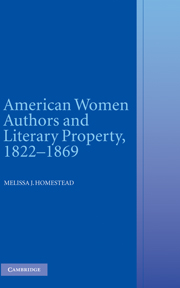Book contents
- Frontmatter
- Contents
- Preface: “Imperfect Title”
- Acknowledgments
- Introduction: “Lady-Writers” and “Copyright, Authors, and Authorship” in Nineteenth-Century America
- 1 Authors, Wives, Slaves: Coverture, Copyright, and Authorial Dispossession, 1831–1869
- 2 “Suited to the Market”: Catharine Sedgwick, Female Authorship, and the Literary Property Debates, 1822–1842
- 3 “When I Can Read My Title Clear”: Harriet Beecher Stowe and the Stowe v. Thomas Copyright Infringement Case (1853)
- 4 “Every body sees the theft”: Fanny Fern and Periodical Reprinting in the 1850s
- 5 A “Rank Rebel” Lady and Her Literary Property: Augusta Jane Evans and Copyright, the Civil War and After, 1861–1868
- Epilogue: Belford v. Scribner (1892) and the Ghost of Mary Virginia Terhune's Phemie's Temptation (1869); or, The Lessons of the “Lady-Writers” of the 1820s through the 1860s for Literary History and Twenty-First-Century Copyright Law
- Index
Preface: “Imperfect Title”
Published online by Cambridge University Press: 24 July 2009
- Frontmatter
- Contents
- Preface: “Imperfect Title”
- Acknowledgments
- Introduction: “Lady-Writers” and “Copyright, Authors, and Authorship” in Nineteenth-Century America
- 1 Authors, Wives, Slaves: Coverture, Copyright, and Authorial Dispossession, 1831–1869
- 2 “Suited to the Market”: Catharine Sedgwick, Female Authorship, and the Literary Property Debates, 1822–1842
- 3 “When I Can Read My Title Clear”: Harriet Beecher Stowe and the Stowe v. Thomas Copyright Infringement Case (1853)
- 4 “Every body sees the theft”: Fanny Fern and Periodical Reprinting in the 1850s
- 5 A “Rank Rebel” Lady and Her Literary Property: Augusta Jane Evans and Copyright, the Civil War and After, 1861–1868
- Epilogue: Belford v. Scribner (1892) and the Ghost of Mary Virginia Terhune's Phemie's Temptation (1869); or, The Lessons of the “Lady-Writers” of the 1820s through the 1860s for Literary History and Twenty-First-Century Copyright Law
- Index
Summary
In 1830, a Congressional committee recommended the extension of the term of copyright protection in the United States, and in its report the committee reasons, “If labor and effort in producing what before was not possessed or known will give title, then the literary man has title, perfect and absolute, and should have his reward.” To have “perfect title” to property is to have an ownership right that cannot be challenged. This 1830 Congressional report was one of very few during the middle years of the nineteenth century to issue such a ringing endorsement of authorial proprietorship, however. Instead, Congress adopted the logic of copyright opponents, who criticized such natural rights arguments for the expansion of copyright, arguing instead that the primary purpose of the copyright law was to serve the interests of readers and publishers. Following this logic, Congress rebuffed repeated attempts to amend the law so that authors who were not citizens or residents of the United States could claim the protection of the U.S. law for their works. Not until 60 years after the passage of the 1831 Copyright Act (extending the term of protection for American authors) did Congress pass an international copyright law at least partially recognizing by statute what the 1830 Congressional report considered natural and inevitable. Although the American “literary man” deserved (according to copyright advocates) a perfect title to his literary productions, his title, not recognized in other countries and devalued on the American market, remained “imperfect.”
- Type
- Chapter
- Information
- American Women Authors and Literary Property, 1822–1869 , pp. vii - viiiPublisher: Cambridge University PressPrint publication year: 2005



